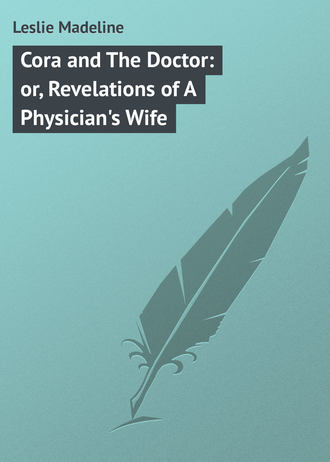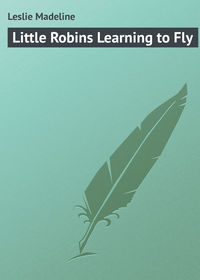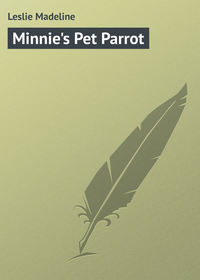
Cora and The Doctor: or, Revelations of A Physician's Wife
Emily recognizes us. We have been in one at a time. She looked at us sweetly, and smiled. "O, Emily!" I even carried Pauline to her room, who just pointed her little finger at aunty, but did not speak.
The Doctor allows not a word of conversation. Now mother has been in, she will not leave, though Frank tells her the nurse can do much better. Her pale, anxious countenance will do his patient no good.
Monday, August 24th.Still encouraging prospects! For the first time since Emily's sickness, Frank passed an undisturbed and quiet night. Strange as it may appear, my mind has been so occupied with sister's immediate danger, I have never thought to inquire of her brother where he found her. It now appears that the young woman, he mentioned in his hurried note to me, was in reality the insane wanderer. But he lost all trace of her after dark, and was about to return home in despair of success in that quarter, when he overheard two women talking earnestly at the door of a house. His attention was arrested by hearing one of them say, "She is every inch a lady." The reply was in a lower tone.
"Well, I can't tell as to that," added the first speaker; "Here she is, away from all her folks, and what is to be done with her?"
Frank says, his heart sprang into his mouth as he rode up to them, and asked if they had seen or heard anything of a lady who had escaped from her friends in a sudden fit of insanity.
"She is here! she is here!!" they both exclaimed.
Frank speedily made arrangements for a driver, and for shawls to wrap around the poor girl, who was alternately shivering with cold or consumed with heat.
Tuesday Morning, September 1st.The nurse left us this morning. She was summoned to a family where she had been previously engaged, and we could not detain her. Mother, Miss Proctor, and I take her place. We succeed admirably. Each of us take our turn in sleeping on a couch beside the bed. Frank wished to take my place, but I decidedly refused. He is often called out during the night; and though he says he is used to it, yet I know he needs sleep when he can get it.
Emily requires but little attention. Only toast-water or arrowroot once in a while. She sleeps most of the time.
I rode to-day with Frank to see Caroline, who fails very fast. I was shocked to observe the alteration. She longs to depart, and wished the Doctor, when he was about to pray, to ask God to give her patience to wait her appointed time. Her mother appears deeply affected, and when Frank addressed a few words of consolation to her, she wept aloud. Then, after a short pause, "I am willing to give up my beloved daughter, if it is God's will; but it comes so suddenly upon me, I am not prepared for it."
As we passed Squire Lee's, I begged my husband to stop and let me speak to Lucy. Mrs. Burns came to the carriage and said if I would alight and go into the parlor, she would take Lucy's place with her father, and request her to come down. I imagined the dear girl looked happier than she did when I saw her last. She said "Though my sad duty at home has prevented my going to you in your trouble, yet I have constantly thought of you."
Joseph is still away, and the Squire continues about the same; but Lucy hopes he will soon be better, as he takes neither wine, nor brandy. It was melting to me to hear her speak of him with such affection. What a dutiful heart he has trampled upon!
When I returned to the carriage, I asked Frank what he thought of the old gentleman's case.
"If he abstains entirely from the use of stimulants," he replied, "he may live for years. But his mind is very much enfeebled, and probably he will not be able to transact any business, hardly to leave the house. Any sudden excitement would terminate his life. This I have tried to impress upon Lucy and the servants."
"Dear girl," I replied, "she seems perfectly happy in devoting her life to the comfort of her miserable father."
"Yes," added the Doctor, "and God will reward her."
CHAPTER XIII
"The peace which passeth all understanding disclosed itself in all her movements. It lay on her countenance like a steady unshadowed moonlight."
Coleridge.Thursday, September 3d.We assisted Emily up into her chair to-day while Ann put fresh linen upon the bed. How she has changed! What a softened, subdued look there is about her! Mother was the first to notice it. Sister is very grateful for every attention, and has asked us to forgive her for causing us so much anxiety. Yesterday she called her brother to the bed, and asked him in a low voice if it would be too much trouble to call the servants to her room, and have prayers there. He was much affected during the service, while Cæsar and Phebe sobbed audibly. She spoke to each one as they passed out of the room in a most affectionate manner.
Sabbath, September 6th.I have been to church all day. I intended to remain with sister this afternoon, but at her special request her brother staid with her, and I went again with mother. A note was read requesting prayers for Caroline Leighton, lying at the point of death; that she might have the presence of her Saviour through the dark valley, and arrive safely at her heavenly home. This was her own dictation. Such notes are common here, and I think very appropriate and salutary.
When I returned from church and was passing into Emily's room, Frank came out and led me to my boudoir. His eyes were inflamed as if he had been weeping. He sat down by me when I had laid off my bonnet, and said softly, "I know, dear Cora, that you will join me in giving God the praise, for salvation has come to this house." He then told me that soon after we left, Emily requested him to bring the Bible to the side of the bed, and read the parable of the prodigal son. He did so, and read in a low tone until he came to the eighteenth verse, when she interrupted him, and with her eyes closed, and her hands clasped as if in prayer, she repeated the words, "I will arise and go to my father, and will say unto him, Father, I have sinned against heaven and before thee, and am no more worthy to be called thy child." She remained in the same attitude for a few moments, when she put her hand into her brother's, saying, "dear Frank, God, my Heavenly Father, has forgiven me." He sank down by her side and buried his face in his hands. "Dear brother," she whispered after a short pause, "will you ask God to enable me to consecrate my life to his service? – My life, which has been heretofore worse than wasted." It was some time before he could pray audibly, though his whole soul was filled with gratitude and praise. He had subsequently some delightful conversation with her, in the course of which she exhibited evidence of a regenerate heart.
Wednesday, September 9th.I have been with my dear husband this afternoon to attend the funeral of Caroline Leighton, who died on Monday evening full of peace and trust in her Saviour. Her last words were uttered but half an hour before she expired, and were, "For I know in whom I have believed, and am persuaded that he is able to keep that which I have committed unto him against that day." She had previously left messages of love for all her friends, together with some little parting token of affection. She begged her father to tell the Doctor what comfort and joy she had experienced in her dying hour; and when he suggested that she should send her thanks for all his attention both to her spiritual and temporal wants, she looked up to him with a smile, and said, "tell him no thanks of mine can repay him, but God will reward him." With a true refinement of feeling she presented me with a little collection of hymns which Frank had given her, and in which she had marked those which best expressed her feelings.
"Oh, Death!Youth and the opening roseMay look like things too glorious for decay,And smile at thee – but thou art not of thoseThat wait the ripened bloom to seize their prey."Thursday, September 10th.Frank is trying to arrange his business for a journey with me as soon as he can leave Emily, who gains daily. A very free conversation passed between her and mother, relative not only to the new feelings and hopes which fill her soul; but also to her affection for Mr. Benson. On the latter of these subjects, she has heretofore maintained the most rigid reserve, excepting only the passionate expressions which I heard. Since that interview a new tie seems to be formed between them. Mother no longer feels obliged to restrain the outward manifestation of affection for her child, while sister in her softened, subdued state heartily reciprocates her feelings and expressions.
Saturday, September 12th.I went yesterday with the Doctor to make a call upon Mrs. Dr. Clapp. From a variety of reasons I have been prevented from calling early, as I intended; but with these reasons both the Doctor and his wife were well acquainted. They have rented a little bird cage of a house, where the young bride performs the offices of cook, house-keeper and chambermaid. The proud husband, who is still so unfortunate as to have plenty of leisure, showed us all their conveniences, and evidently thought himself the happiest man, and his wife the dearest woman in the country. She is obviously a keeper at home, shrinking like a sensitive plant from contact with strangers, but unfolding and expanding in the congenial atmosphere of home, and home friends. No doubt the grateful Doctor had set forth in glowing terms "the unprecedented kindness of Dr. Lenox." With many blushes she thanked me cordially for the kind interest we had taken in his welfare. Frank made satisfactory arrangements with Dr. Clapp, as to leaving his business with him during our short absence, and when he began earnestly to express his thanks, my husband cut him short by saying, "I regard myself altogether as the obliged party." We enjoyed the visit much. After returning a few of the many calls made upon me, I was glad to be at home again. "There is no place like home."
Monday, September 14th.We have decided to leave home on Wednesday morning, in order to take P – on our way, to be present at a Quaker wedding, when Elizabeth Estes will become Elizabeth Nelson. We expect to go to B – , a flourishing town in the western part of New York. I pleaded hard to take Pauline with me, as Ann could well be spared for nurse; but the Doctor was inexorable. When he is decided, one might as well undertake to remove the mountains into the sea, as to change his determination. Yet I must confess his decisions are generally wise. Respectful as he always is to his mother, and ready to yield to her wishes, yet when she sees he has fully made up his mind upon a point, she never tries to change his decision. Pauline will remain under the care of mother and Emily. Frank is determined that I shall reap great benefit from this journey, and so I suppose I shall. In truth, my health is his great motive for going. I have grown excessively nervous and low-spirited. I want to sit on a cricket at your feet, and lay my head in your lap, dear mother, and have you comfort and cheer me. I try to reason with myself that I have no occasion to feel thus, but I cannot help it; the next morning I am as bad as ever. Frank tries to comfort me by saying that it is owing to my state of health and to my loss of appetite, and that I shall soon be better.
Tuesday, September 15th.This morning Ann knocked at my door, and said Phebe begged I would go to the kitchen. I went and found a little girl and boy hand in hand awaiting me. The girl I should judge was six or seven years of age; the boy was not more than four. He kept his eyes fixed upon me, with an earnest, serious expression, while his sister explained her errand, as if the business they came upon, was in their opinion of great importance and magnitude. The little girl, in a singularly sweet voice, asked me humbly if I had any work I wanted to have done. I smiled as I inquired, "is the work for you or for your brother?" She understood the smile and said quickly, "I can weed in a garden, or run of errands, or," turning to Phebe with rather a doubtful look, "scour knives and wash dishes. I'll be very careful not to break them, ma'am."
"Where are your parents, Anna?" I asked when she had given me her name.
"My mother is sick in bed," she replied sadly.
"And your father, is he dead?"
"No, ma'am," she answered, timidly dropping her eyes to the floor, while a burning blush flashed over her pale wan countenance, extending even to her very temples. Her little brother looked at her, and then at me. Encouraged, I suppose, by my sympathy, he said, "Pa aint good. Pa's a bad man, he licks ma when she's sick."
I hastily inquired where they lived, and requesting Phebe to give them some breakfast returned to my room, where Frank was shaving. I told him what I had heard, when he interrupted me, "Ah, Reynolds has been having another spree! I'm sorry for his poor wife and children. This man," said he, turning from the mirror to look at me, "is another of Squire Lee's hopeful protegés. Oh!" he continued after a moment's pause, while he went on with his shaving, "the misery that distillery has caused in this place, would if written down fill volumes."
"What can I do for the poor children," I asked. "They want work."
"Well, give them something to do, and pay them with a basket of food. Mrs. Reynolds would hardly accept it as a gift. I will ride around that way when I am out, and see what can be done."
As I returned to the kitchen, I fairly taxed my ingenuity to find some employment suited to their capacities; but in vain. So I determined to appeal to Phebe. "My good Phebe," said I, "have you no work for these children who are so anxious to be employed?"
"Laws now missus!" answered Phebe, "It's no kinder use settin sich babies to work. There's heaps on em comes here a beggin. If missus would give em a cold bite now to carry to their sick ma, 'pears like dere'd be some use in dat ar."
I wish I could describe to you the anxious expression with which these poor little creatures regarded Phebe as she replied, as if they would implore her to answer more favorably. I saw that the good woman had no idea of the real state of the case, and taking her into the hall I explained to her that they had not been used to begging, and I did not like to break down the independence and delicacy of feeling, I so much admired. With a toss of her turban the truly kind-hearted woman signified that she fully understood me, and when I told her farther that her master was going out directly to the aid of their mother, she was ready to do her full part in assisting them. She stood one moment to think what she should set them about, as she expressed it, when her countenance brightened as she exclaimed, "Wal now, if that ar aint kind o' curus. There's me's been a tellin my ole man how desp't bad I wanted de brush picked up clean out dar in de orchard fore cold wedder comes; but laws, he never has no time for notting." When we returned to the kitchen, the brother and sister had finished their breakfast, and sat awaiting the important decision. I suggested that it would be well for them to carry something previously to their mother, and obtain her consent to remain through the day. She would thus be relieved from all anxiety concerning them.
As I committed the basket of food to the eager hand stretched out for it, I was struck with the expression of the child's countenance. It shone like that of an angel. Nor did I wonder at it, when gently pulling my dress she reached up to speak to me, and said, "I felt sure, ma'am, we should get some," glancing at the basket.
"Why, my dear?"
"Because this morning, I said, please God give me some bread for my poor sick ma."
"Were you sure, God would hear you?" I asked, wishing to hear farther. Looking up in surprise, she answered, while her eyes grew bright, "why you know ma'am, he says, 'ask and ye shall receive.' Ma told me that he says so in the Bible."
What a beautiful lesson of trust! I kissed them both and let them go. Phebe, whose sympathies were now thoroughly enlisted, followed them to the door, saying, "tell your ma, she shan't want for vittles while mass'r 'lows ole Phebe to save em for yees;" and then remembering what I had told her, she added, "tell her thar's heaps o' work o' waiting for yees."
Afternoon.As I have finished my packing, I will tell you that Phebe's protegés, Anna and Willie, soon returned and went to work with such good will upon the brush that madam was enthusiastic in their praise. They brought me word that their mother was very much obliged to me for letting them earn the food. The Doctor found her sick with a cold. In a fit of intoxication her husband turned her out of the house, where she was obliged to remain until chilled through. Frank advised her to complain to the public authorities and have him confined for a time. "Oh, Doctor!" she replied, "he's not himself when he treats me so ill. He never would do it if it were not for rum. Oh, dear!" she continued, beginning to cry, "we were so happy until he went to work in that horrid distillery."
How many poor distressed wives and children have said the same! Happy indeed should we be if it were not for rum! I have become so much interested in the family, that I would gladly postpone my journey another day, for the sake of visiting her, were it not for my desire to be present at Elizabeth's wedding. Mother Lenox needed no urging to attend to the wants of the family while the Doctor is absent. I requested Frank to give me the history of the Reynolds family; but he smiled as he said, "you are so systematic a person I should be obliged to begin at the beginning, and relate every fact in due order, which would take more time than I can well spare." He promised, however, to gratify my curiosity at another time. Dear little Pauline has no idea that I am to leave her. But she will be taken good care of I doubt not. Emily pets her rather too much.
CHAPTER XIV
"On thee, blest youth, a father's hand confersThe maid thy earliest, fondest wishes knew;Each soft enchantment of the soul is hers;Thine be the joys to firm attachment due." Rogers.Monday, October 19th.It is six months to day since I was married and left my beloved home. What would you say to your daughter if she were to tell you that sometimes she has been so unthankful for all her mercies as to wish she had never left the shelter of the paternal roof or the warm embrace of parents and sisters. But so it has been, and I have determined to confess it to you. I think it will guard me from ever indulging again in distrust or jealousy. But I forget that I have told you nothing of our journey and return. I have enough to fill many pages of my journal.
We started on a clear, bright morning in September, and in two or three hours reached P – . We went directly to the house of Friend Shove, where we met by appointment Friend Estes, her husband Jotham, and her daughter Elizabeth. I suppose Jenny, our old nurse at home, would have told me as she used sometimes to do when I was a child, that I had "got out of bed wrong," for I felt cross all the morning. And when as we rode on, (we were in our own carriage, and some of the wedding party were to take it back,) Frank tried to cheer me, and said kindly, "You must expect sometimes to feel a little out of tune," I only felt worse. When, however, I saw the smooth, placid face of Friend Estes, and her bright, smiling, blushing Lizzie, as she is affectionately called, I began to think there were pleasant spots in the world after all. And when I had sat down at a neat table covered with everything to tempt one's appetite, and had taken a cup of delicious coffee, and a slice of ham, I felt decidedly more reconciled to life. I could eat nothing before I started. After waiting half an hour, we all walked to meeting, where, as in England, among the same denomination, the males occupy one part of the house and the females the other. Josiah Nelson and Elizabeth Estes sat on the high seat in front of the audience, and in sight of all of them. After sitting for some time without a word being spoken, Josiah arose and took Elizabeth by the hand, saying, "In the presence of this assembly, I take this my friend Elizabeth Estes to be my wife, promising through divine assistance to be unto her a faithful and affectionate husband until death shall separate us."
Then Elizabeth in a sweet voice which she vainly tried to keep from trembling, said, still holding her friend by the hand, "In the presence of this assembly, I take this my friend Josiah Nelson to be my husband, promising through divine assistance, to be unto him a faithful and affectionate wife until death shall separate us."
They then subscribed their names to the certificate, which was as follows: – "Whereas, Josiah, son of Samuel and Hannah Nelson, and Elizabeth, daughter of Jotham and Elizabeth Estes, have declared their intentions of taking each other in marriage to P – monthly meeting of the Society of Friends held in P – , according to the good order used among them; and their proceedings after due inquiry and deliberate consideration thereof being allowed by the said meeting; they appearing clear of all others, and having consent of parents, these are to certify to all whom it may concern, that for the full accomplishment of their said intention, this sixteenth day of the ninth month, in the year of our Lord one thousand eight hundred and thirty-five, they, the said J. N. and E. E., appeared at a religious meeting of the aforesaid society in P – , and did declare," etc. [See marriage contract as above.]
After this novel and interesting ceremony had concluded, we returned to a most bountiful dinner with the hospitable family of Friend Shove; and soon after bidding our friends "farewell," we proceeded on our journey.
CHAPTER XV
"Foul jealousy! that turnest love divineTo joyless dread, or mak'st the loving heartWith hateful thoughts to languish and to pine,And feed itself with self-consuming smart;Of all the passions in the mind thou vilest art." Spenser.Evening, October 19th.We reached B – on Tuesday evening, September 22d, where we were cordially welcomed by Mrs. Morgan, a sister of Frank's father. The family consists of Mr. and Mrs. Morgan, and their son Joseph Lenox, named for his uncle. There was also Mrs. Fidelia Schuyler, an orphan niece of aunt Morgan, who had been married but a few months. She is a child of aunt Morgan's brother, who has been deceased many years. As I shall have much to say of her, I will describe her as she presented herself to me at the time. She appeared to be about twenty years of age, with very light flaxen hair, hanging in loose curls at the side of her face. She had blue eyes, and a somewhat fair complexion. At the first glance I thought her a very little like Emily in expression; but afterwards wondered how I could have thought so. Emily's eyes are a splendid gray, fringed with long, black lashes, and her hair is the darkest shade of auburn, like Frank's.
Fidelia received me cordially enough; as I was a stranger, I could not expect she would be as glad to see me as she was to see her own cousin. I felt almost hurt that Frank did not more fully reciprocate her joy at their meeting. There was a perfect fascination to me about this young bride. She was constantly changing like the colors and figures in a kaleidoscope. Sometimes she would introduce conversation with the Doctor upon politics, and really talk very sensibly, so that I felt ashamed that I was ignorant of such subjects. Then she would talk of old times in a manner I did not at all understand. I fancied once or twice that Frank, to whom all this conversation was addressed, looked rather annoyed, and supposed it was in consequence of my listening so closely; I therefore turned to my cousin Joseph. He claimed me as such, before I stepped from the carriage. He is a fine intelligent youth near my own age I should imagine; and though he made many inquiries about his aunt and Emily, which I was occupied in answering, yet I could not wholly withdraw my attention from the cousin near me. Her voice would often drop to so low a key that I could not distinguish the words; but its intonation was soft and languishing, and her whole appearance, to say the least, as she sat upon the sofa with Frank, was certainly peculiar. Joseph observed my frequent glances in that direction, and he whispered, "The greatest coquette," motioning with his head towards his cousin, "in the known world."









